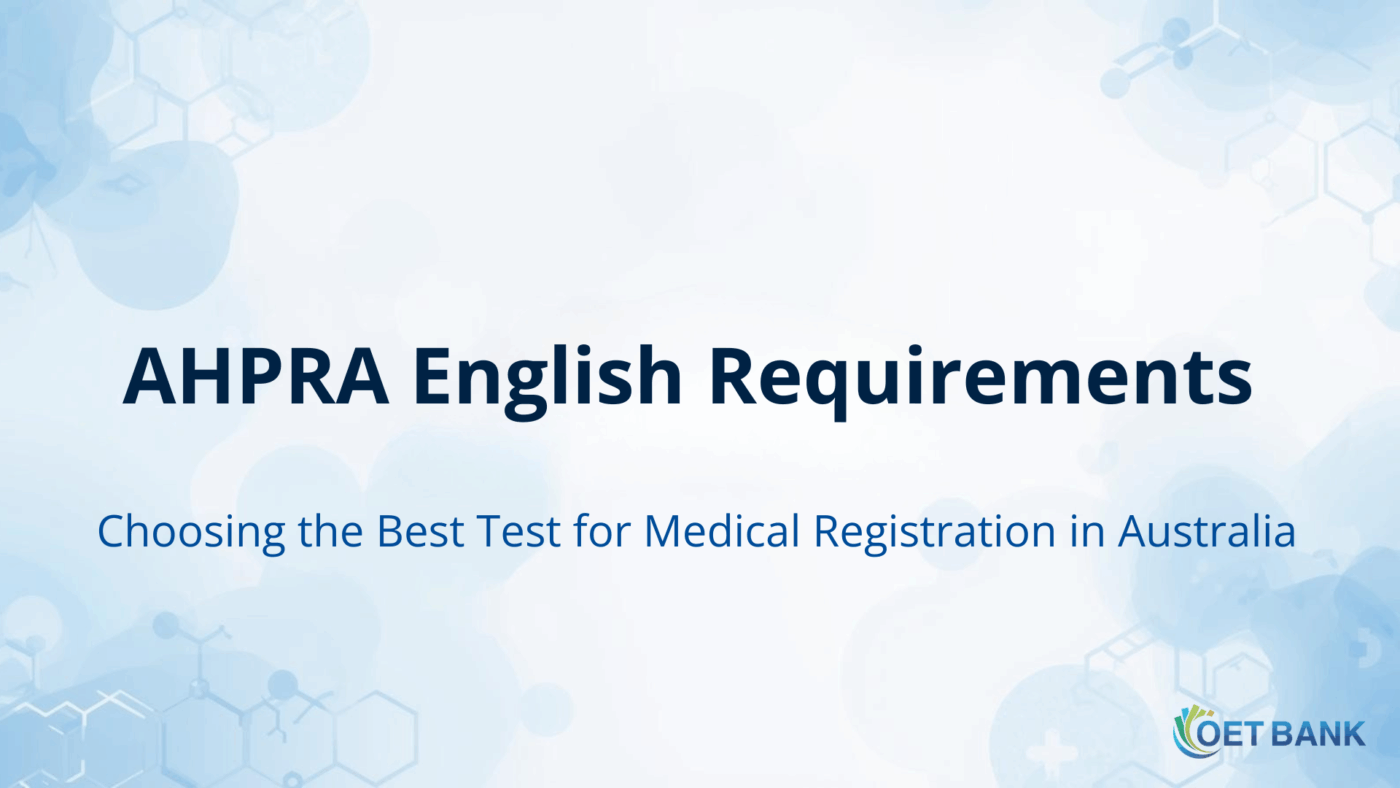Registration & Pathways
Which Exam Should I Choose? English Test Requirements for AHPRA Registration
If you’re preparing for OET or planning your medical career in Australia, understanding AHPRA’s English requirements is a crucial first step.
This guide explains each approved test clearly, compares their characteristics, and helps you choose the most suitable option based on your strengths.
English Tests Required for Medical Registration
To work as a doctor or nurse in Australia, you must register with the Australian Health Practitioner Regulation Agency (AHPRA), which oversees medical registration across the country.
AHPRA requires you to meet one of the approved English language standards.
Below are the four test options:
- IELTS: Overall 7.0 or higher (L/R/S 7.0, W 6.5)
- OET: Minimum score of 350 (L/R/S 350, W 300)
- PTE Academic: 65 or higher (L/R/S ≥66, W ≥56)
- TOEFL iBT: Total 94 or higher (R/L/W ≥24, S ≥23)
Reference: English language skills
https://www.ahpra.gov.au/Registration/Registration-Standards/English-language-skills.aspx
All four tests assess the four core language skills: Listening, Reading, Speaking, and Writing. Each takes approximately 2–3 hours and is similar in difficulty to advanced academic English exams.
Since there are multiple options, the next sections compare their characteristics to help you choose the most suitable test.
IELTS
IELTS is one of the most widely taken English exams in the world, with millions of test-takers globally every year. It is available frequently in major cities, and in some locations—such as Shinjuku—sessions are held nearly daily.
Scores are reported in band levels from 0 to 9.0 in 0.5 increments. You must achieve at least 7.0 in Listening, Reading, and Speaking and 6.5 in Writing.
Because the scoring range is narrow, a difference of 0.5 is significant. For many learners, improving by 1.0 band can take roughly one year.
For IMGs, Reading and Listening are manageable with consistent study. However, achieving 7.0 in Speaking is especially challenging. Many candidates spend 1–2 years trying to raise Speaking from 6.5 to 7.0.
IELTS is a strong test for building general academic English ability, but because Writing and Speaking are highly demanding, it may not be the most efficient route to achieve the required scores.
OET
OET is specifically designed for healthcare professionals. Its purpose is to measure whether non-native medical practitioners possess the English skills required to work safely in clinical settings.
All candidates take the same Reading and Listening tests, but the Writing and Speaking tasks differ depending on your profession (e.g., medicine, nursing, pharmacy).
Scores are reported in both letter grades (A–E) and numerical values (0–500):
- A: 450–500
- B: 350–440
- C+: 300–340
Compared with IELTS, OET’s Writing and Speaking are often easier to prepare for because the content reflects real medical communication—referrals, handovers, consultations, and clinical scenarios.
However:
- The Reading test contains tricky distractors, and choosing the correct answer can be difficult.
- The Listening test is fast and often features strong Australian accents, which many IMGs find challenging.
Still, OET is the only test among the four that directly prepares you for real clinical communication and aligns closely with AMC preparation.
For these reasons, OET is generally the most recommended option for IMGs.
PTE Academic
PTE (Pearson Test of English Academic) is an AI-scored general English exam. Its topics are similar to IELTS and broadly academic.
Among major English-speaking countries, Australia is the only nation that accepts PTE for medical registration. One of its biggest advantages is the very fast results, usually released within 24–48 hours.
Each skill is scored from 10 to 90, and achieving ≥66 meets AHPRA’s requirement.
Many IMGs find it easier to score well in Reading and Writing. However, Listening and Speaking scores can vary widely depending on:
- voice clarity
- speaking speed
- microphone quality
- memory-based tasks
Because scoring is automated, candidates with quiet voices, slow speech rates, or lower confidence may receive unexpectedly low results.
PTE is not the best starting point. It is better considered after attempting IELTS or OET, especially if you struggle with performance-based evaluation.
TOEFL iBT
TOEFL, created by ETS, assesses whether candidates can handle the English used in North American academic environments.
Topics are academic, similar to IELTS, but more specialized—space science, biology, natural sciences, anthropology, and history are common.
Each section is scored out of 30 for a total of 120. AHPRA requires:
- Total ≥94
- R/L/W ≥24
- Speaking ≥23
For IMGs, TOEFL is often regarded as the most difficult of the four exams. The Listening passages are long and complex, and the integrated Speaking/Writing tasks require you to listen, read, and respond under strict time limits.
Because achieving the required Speaking and Writing scores is extremely challenging, TOEFL is generally not recommended as a primary route.
Conclusion
To summarise:
- IMGs can choose from four English tests.
- OET is the strongest choice, especially considering AMC preparation and clinical relevance.
- Those uncertain about their English level may begin with IELTS, then switch to OET once they reach Band 6.5.
- For most IMGs, OET offers the quickest and most realistic path to meeting AHPRA’s requirements.
IELTS has abundant study materials and is familiar to many candidates. Achieving an overall 7.0 is not extremely difficult, but Speaking 7.0 remains a major barrier.
A strategic approach is:
- Build foundational skills with IELTS (target 6.5).
- Transition to OET for clinically focused preparation.
Because OET reflects real medical communication, motivation tends to increase, and the skills learned translate directly to clinical practice in Australia.
For detailed comparisons between IELTS and OET, see:
https://oet-bank.com/oet-b-vs-ielts-7/
Study with OET BANK
Stop wasting time comparing OET materials.
With OET BANK, you get:
- Premium-quality OET materials, built by professionals
- A focused, efficient study path — no unnecessary content
- A system designed to help you pass OET once — without trial and error
If you want to prepare properly and pass with confidence,
you don’t need to look anywhere else.
Pick your materials and start today — with OET BANK.




